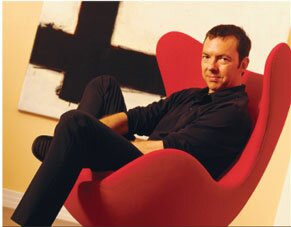FILM- Rosy outlook: From satires to vampires with Alan Ball

Alan Ball
PUBLICITY PHOTO
When Alan Ball wrote the satirical screenplay American Beauty, he didn't specifically mean it as a scathing commentary on suburban life.
"I happen to live in suburbia," Ball, 52, told the Hook recently. "And I like it."
His script dealt more with the zeitgeist of suburbia, and he intended his account of middle-class dad Lester Burnham's dissolution "to be an indictment of the shallowness of American values that [Americans] are basically conditioned from birth to accept as gospel," he explains.
"In that regard," he says, "I don't know if there is any more scathing indictment of American culture than American culture itself."
Ball's targets seem peculiarly ironic— but not illogical– considering that his prior writing background was mainly in pure Americana: sitcoms. But his days of unrewarding toil on shows like Grace Under Fire soon ended: American Beauty won him the 1999 Academy Award for best original screenplay, among numerous other laurels.
"It became this phenomenon," Ball marvels. "Who knows why?"
Being thrust into the spotlight, Ball recalls, "was a strange experience... It's a place that I'm not entirely comfortable. And all the things that are really, really huge traps for an artist of any kind were all just sprung on me at once."
Ball dodged those traps smoothly, and next developed the hugely popular HBO series, Six Feet Under, which, for five seasons, chronicled the lives of a family of morticians. In 2008, he followed it up with HBO's True Blood, an adaptation of Charlaine Harris' Sookie Stackhouse vampire novels. Set in Louisiana, the series traces a vast undead community's attempts to assimilate into everyday human life.
Appropriately, Ball discovered the novels while waiting for a dental appointment. At a bookstore, he was amused by the tagline for Harris' Dead Until Dark– "Maybe having a vampire for a boyfriend wasn't such a good idea after all"— and bought the book. "I really just couldn't put it down," he says.
Like a vampire guzzling type-O negative, he was hooked. Somewhere around reading the fourth book, he envisioned Harris' novels as a TV series. "What I really loved," Ball says, "was that they walked this razor's edge of tone between romance and the supernatural and horror and comedy and social commentary and Wal-Mart trailer park people... I just found it delightful. It was so escapist and so much fun."
True Blood has further cemented Ball's warm relationship with television, in which, it seems, he is content. Or is he?
"It's just a lot easier to get interesting, complicated, morally ambiguous stories about flawed characters done on the small screen," he says, "than it is on the big screen."
Pinning down a unifying theme in the wildly disparate subjects of Ball's work is tricky. But while discussing his sense of humor, he gives more than a little hint about it.
"One of my ways of dealing with depressing matters," he explains, "is to make fun of them. It is one of the things that I learned in adolescence, and I've never really outgrown it because it has helped me survive a lot."
~
Alan Ball will host a screening of True Blood at 10:30 am Sunday, November 8, at UVa's Culbreth Theatre. At noon that day, also at Culbreth, he will introduce American Beauty, which will be followed by a Q&A.
#